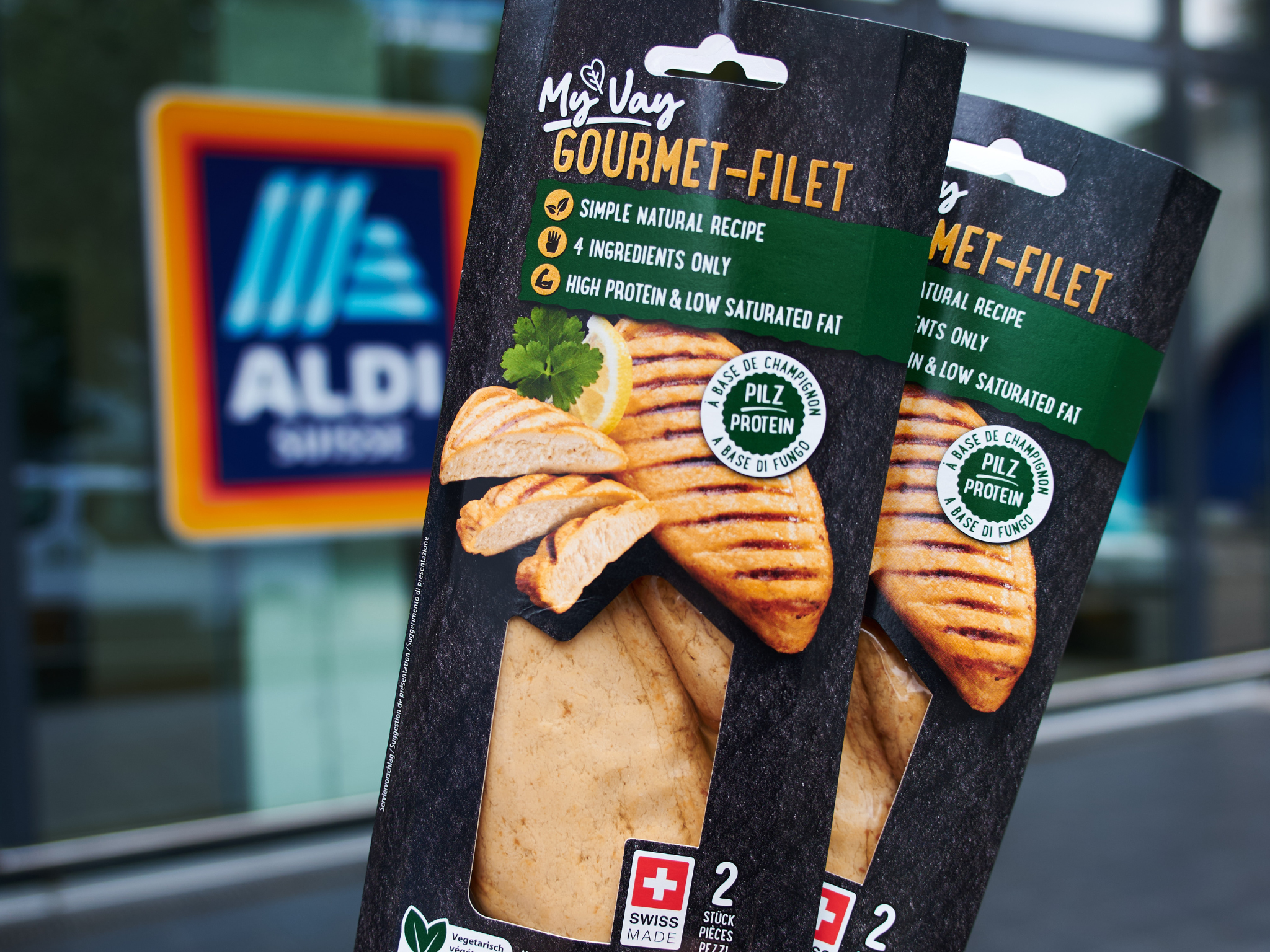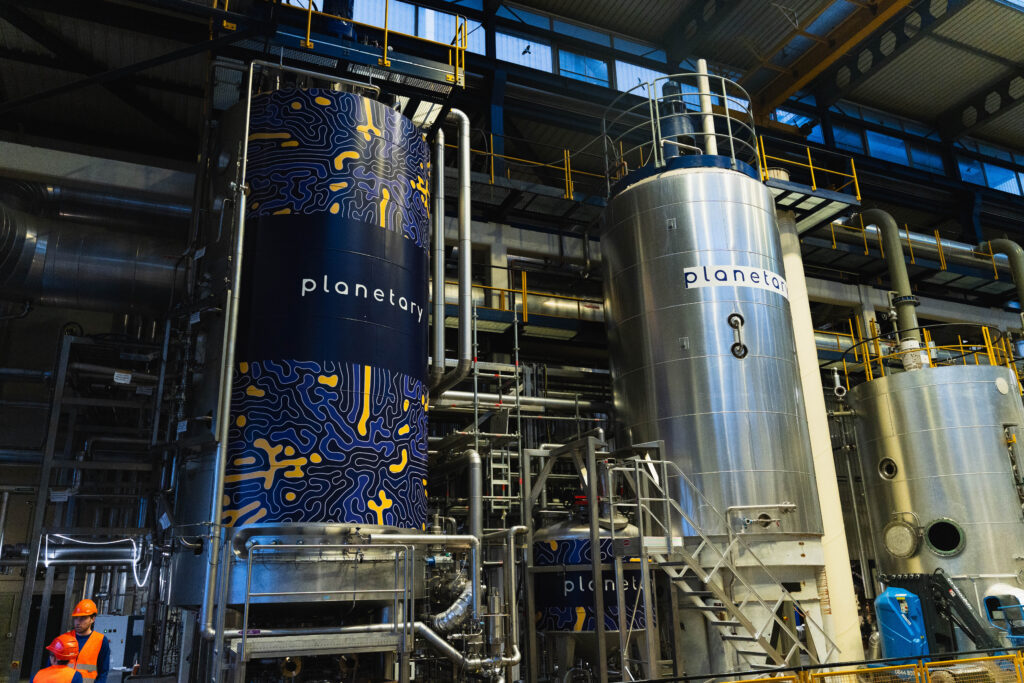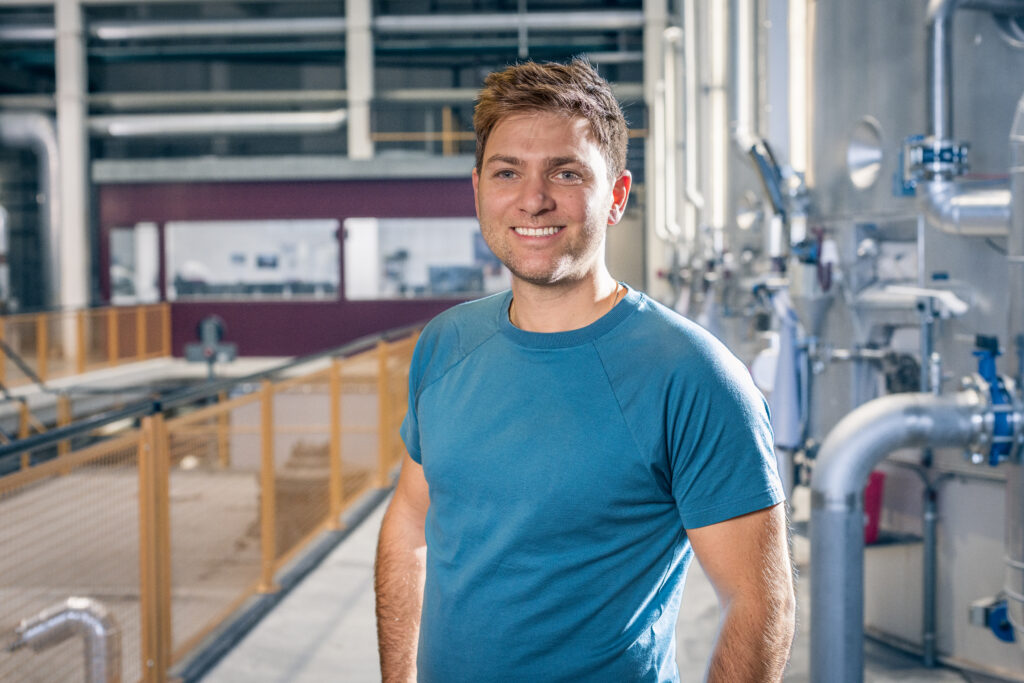
Discount retailer Aldi Suisse has launched a cost-competitive meat-free chicken filet under its MyVay brand, using Planetary’s Libre mycoprotein.
Visitors to Aldi Suisse’s stores can now buy a vegetarian chicken filet with four ingredients and the same price as conventional meat, thanks to the supermarket’s partnership with domestic biomanufacturing firm Planetary.
The retailer has launched a Gourmet Filet under its MyVay meat-free label in 242 stores, combining Planetary’s Libre mycoprotein with egg whites, sunflower oil, and natural flavouring to offer consumers a clean-label alternative to chicken.
It’s the first product featuring the mycoprotein ingredient following Planetary’s acquisition of Spanish startup Libre Foods last month, which included its core brand, commercial agreements, and IP for mycelium protein.
“We have acquired Libre’s assets to create synergies with our current production capabilities and commercial strategy. These assets will help accelerate the commercialisation of Planetary’s fermented mycoprotein,” Planetary co-founder and CEO David Brandes tells Green Queen. “The Libre trademark will be dedicated to the B2B marketing of mycoprotein to our partners in retail and the food industry.”
He adds: “We are particularly proud of the first product launch with this strategy… just in time for the barbecue season.”
How Planetary bagged the Aldi Suisse collaboration

The Libre mycoprotein uses biomass fermentation and leverages the entire fungi organism, utilising upcycled materials and high-performing strains to achieve “industry-leading yields”. Libre Foods first teased a whole-cut chicken breast made from mycelium in 2023, though this is the first time an iteration of that has been commercialised.
“At the heart of our recipe is mycoprotein, which makes up 93% of our product and is produced in our factory in Aarberg, Switzerland, through fermentation of a type of fungus,” says Brandes. “To give slightly more firmness to our product, an egg white is in our recipe, while natural flavour and sunflower oil help enhance the juicy and meaty experience of MyVay Gourmet Filet.”
He adds: “As we focused on the aspect of minimal processing, the Gourmet Filet is produced extremely simply with the key steps involving only mixing, shaping and cooking – it is really that simple.”
The partnership with Aldi was the result of a successful debut at Swiss Food & Nutrition Valley and Aldi Suisse’s Retail Shelf platform, which offered food innovators a chance to pitch their products and potentially put them on the retailer’s shelves.
“During our product development process, we aimed to make the Gourmet Filet simple, with few ingredients, minimal processing, and obviously a great taste and meat-like bite. Thankfully, the task was made easier by using a planet-friendly ingredient, mycoprotein, which naturally has a meat-like texture and neutral, yet slightly savoury taste,” recalls Brandes.
“Clearly, we had a big success with our innovative mycoprotein-based gourmet filet, which tastes great and was especially praised for its short and natural ingredient list.”
The meat-free chicken packs 18g of protein in each 105g filet, while containing nearly 7g of fibre and just 0.5g of saturated fat.
Planetary earns Swiss government grant for scale-up

Based in Geneva, Planetary operates the only active industrial mycoprotein facility in continental Europe and is building a unique full-stack biomass and precision fermentation platform in line with the agro-industrial complex, titled BioBlocks. It’s designed to support the development and industrialisation of future-facing food and material solutions, using a wide array of feedstocks.
“With Aldi, amongst other customers, selecting our naturally fermented mycoprotein, we are proving sustainable proteins can match the price and experience of animal-based protein,” says Brandes.
The MyVay mycelium chicken filet is priced at 4.99 francs per 210g pack, or 22.7 francs per kg. “This puts Planetary’s product at price parity with Aldi’s Swiss chicken filet. In fact, our product is cheaper than many of the other alternatives on the Swiss market, despite being very high quality,” he explains.
Brandes described mycoprotein as a whole ingredient naturally high in fibre and protein. Unlike most plant proteins, it is not chemically extracted, spray-dried or extruded. “Its neutral taste and natural fibrous texture make it really easy to incorporate in meat and dairy alternative recipes without heavy processing and many additives, contrary to other protein sources like soy or pea,” he notes.
In fact, Planetary was recently named a finalist in the cheese alternative competition run by Lidl Germany and the ProVeg Incubator, where it was recognised for applying its global patent to leverage mycoprotein in non-dairy formats like milk and cheese.
Speaking of which, the firm was one of 10 winners of the 2025 Global Award by the World Intellectual Property Organization (WIPO), thanks to its strategic use of IP to address sustainability challenges and achieve breakthroughs in scalable industrial fermentation.
As it looks to scale up production at its Aarberg faciliry, Planetary has now secured a grant of 1.8 million francs ($2.26M) under national innovation agency Innosuisse’s Startup Innovation Project.
“The recognition from Innosuisse and WIPO highlights the industrial maturity and technology leadership of our platform,” says Planetary co-founder and CSO Ian Marison. “We’re building real-world infrastructure that proves how scalable fermentation can bring sustainable proteins to market at speed and cost, not just in theory, but in practice.”
New partnerships and products in the pipeline

Thanks to a large flexitarian population, Swiss consumers are already eating less meat and dairy, though plant-based meat only appeals to 15% of this cohort. The new dietary guidelines and national nutrition strategy both call on citizens to eat more plant proteins.
While the Aldi Suisse filet is vegetarian, Planetary has also developed a vegan iteration of the chicken alternative. This uses a “proprietary, short and clean-label binding system” specifically developed for the firm’s mycoprotein applications, replacing the egg white with a two-ingredient plant-based binder. “We are planning to launch the vegan version of the filet with another food industry partner in the near future,” says Brandes.
The company chose to use a white-label approach as it provided a faster path to market. “Planetary can benefit from the strength of the MyVay brand to reach consumers, without the lengthy process of building up brand strength and engagement,” he explains. “For Aldi, it’s a great opportunity to expand its product portfolio and offer a minimally processed, protein and fibre-rich meat alternative.”
Laying out the firm’s plan for the next 12 months, Brandes says Planetary is looking to expand across geographies and categories as it builds out its fermentation capacity both in Aarberg and through partnerships with the agro-industrial complex. It will soon announce asset-light expansion co-location partnerships via the tech licensing of its BioBlocks platform at strategically suitable locations, which will turn sidestreams into value-added protein.
“On the demand side, we’re preparing additional distribution agreements for the coming months in retail and food service, with other national and international distributors, as well as with food producers,” he reveals. “Our first short-term target is the Swiss market, but we also have sales opportunities in Germany, France, and the rest of Europe.”
Aside from Aldi Suisse, there are several other partnerships in the pipeline. “In particular, we developed B2B recipes based on mycoprotein for our partners: cold cuts, sausages, schnitzel, burger patties, milk, cheese, and even protein powder,” says Brandes.
“Currently, Planetary is, to our knowledge, the only commercial mycoprotein producer in continental Europe today. That said, we would appreciate seeing more mycoprotein producers succeed in building industrial scale and functional production infrastructure producing at retail-realistic cost in order to tackle the vast opportunity of ‘feeding the 10 billion’ jointly.
“In the long run, Planetary will be positioned as a bioeconomy leader harnessing the power of microbial organisms to innovate the world as we know it today, reaching far beyond the food sector, and we welcome conversations with mission-aligned partners and investors at any time.”
The post Aldi Suisse Unveils Clean-Label Mycoprotein Chicken Filet at Price Parity with Meat appeared first on Green Queen.
This post was originally published on Green Queen.